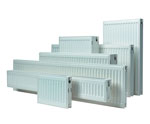We’ve all been there. You've just redecorated a room; everything looks perfect, except one thing: the radiator. Radiators are rarely considered works of art, and in a beautifully decorated room, they can actually drag things down. Today, we are going to teach you how to avoid this issue by making the right choices and ensuring that you select a radiator that will suit the room.
The first thing that you need to think about in terms of the suitability of the radiator to the room is the amount of heat that the room needs. There’s no point spending money on a beautiful radiator, one that suits the room from an aesthetic perspective, only to find that it doesn’t provide enough heat.
OK, so your first task is to use a BTU (British thermal units) to establish the heat output requirements of the radiator. You can then use this figure to limit your search. It helps you to avoid disappointment too. If you don’t do this first, you might find a range of beautiful designer radiators and only discover later that they're inappropriate. We all know what happens then: no future radiators live up to the original range.
Now that you know the BTU needed, you can now begin to look at style. In general, you need to keep the style of the room in line with the style of the radiator. For example, if you're room is decorated in an English countryside style, then it will suit a column radiator in cast iron – the traditional panel radiators simply won’t do. Alternatively, you may have decorated the room in an art deco fashion, in which case, you should choose an art deco radiator.
Finally, we would advise you to shop for your designer radiators online. This is because they offer far more choice than the bricks-and-mortar shops do. You are much more likely to find a suitable style if you use the internet.
Are you interested in buying new radiators? If so, please visit http://www.designerradiatorsdirect.co.uk/.



